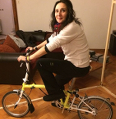Studying at the University of Verona
Here you can find information on the organisational aspects of the Programme, lecture timetables, learning activities and useful contact details for your time at the University, from enrolment to graduation.
Academic calendar
The academic calendar shows the deadlines and scheduled events that are relevant to students, teaching and technical-administrative staff of the University. Public holidays and University closures are also indicated. The academic year normally begins on 1 October each year and ends on 30 September of the following year.
Course calendar
The Academic Calendar sets out the degree programme lecture and exam timetables, as well as the relevant university closure dates..
| Period | From | To |
|---|---|---|
| Sem. 1A | Oct 4, 2010 | Nov 14, 2010 |
| Sem. 1B | Nov 15, 2010 | Jan 16, 2011 |
| Sem. 2A | Feb 21, 2011 | Apr 10, 2011 |
| Sem. 2B | Apr 11, 2011 | Jun 5, 2011 |
| Session | From | To |
|---|---|---|
| Sessione invernale (A.A. 2009-2010) | Jan 17, 2011 | Feb 20, 2011 |
| Sessione estiva (esami sospesi dal 5 all'8 luglio) | Jun 6, 2011 | Jul 31, 2011 |
| Sessione autunnale | Sep 1, 2011 | Sep 30, 2011 |
| Session | From | To |
|---|---|---|
| Sessione estiva | Jul 5, 2011 | Jul 7, 2011 |
| Sessione autunnale | Nov 15, 2011 | Nov 17, 2011 |
| Sessione invernale | Mar 13, 2012 | Mar 15, 2012 |
| Period | From | To |
|---|---|---|
| All Saints | Nov 1, 2010 | Nov 1, 2010 |
| National holiday | Dec 8, 2010 | Dec 8, 2010 |
| Christmas holidays | Dec 22, 2010 | Jan 6, 2011 |
| Easter holidays | Apr 22, 2011 | Apr 26, 2011 |
| National holiday | Apr 25, 2011 | Apr 25, 2011 |
| Festa dei lavoratori | May 1, 2011 | May 1, 2011 |
| Local holiday | May 21, 2011 | May 21, 2011 |
| National holiday | Jun 2, 2011 | Jun 2, 2011 |
| Summer holidays | Aug 8, 2011 | Aug 15, 2011 |
Exam calendar
Exam dates and rounds are managed by the relevant Humanistic Studies Teaching and Student Services Unit.
To view all the exam sessions available, please use the Exam dashboard on ESSE3.
If you forgot your login details or have problems logging in, please contact the relevant IT HelpDesk, or check the login details recovery web page.
Should you have any doubts or questions, please check the Enrollment FAQs
Academic staff
 lorenzo.carpane@univr.it
lorenzo.carpane@univr.it
 donato.desilvestri@univr.it
donato.desilvestri@univr.it
 mario.guidorizzi@univr.it
mario.guidorizzi@univr.it

Longo Mario
 mario.longo@univr.it
mario.longo@univr.it
 045 8028393
045 8028393

Migliorati Lorenzo
 lorenzo.migliorati@univr.it
lorenzo.migliorati@univr.it
 045802 8135
045802 8135
 antonio.nocera@univr.it
antonio.nocera@univr.it
 gabriel.sala@univr.it
gabriel.sala@univr.it
Study Plan
The Study Plan includes all modules, teaching and learning activities that each student will need to undertake during their time at the University.
Please select your Study Plan based on your enrollment year.
1° Year
| Modules | Credits | TAF | SSD |
|---|
History of Philosophy
History of Education and Pedagogy
2° Year activated in the A.Y. 2011/2012
| Modules | Credits | TAF | SSD |
|---|
Teaching methodology and educational planning
3° Year activated in the A.Y. 2012/2013
| Modules | Credits | TAF | SSD |
|---|
Social and Cultural Geography
Theories and techniques of the primary socialization
| Modules | Credits | TAF | SSD |
|---|
History of Philosophy
History of Education and Pedagogy
| Modules | Credits | TAF | SSD |
|---|
Teaching methodology and educational planning
| Modules | Credits | TAF | SSD |
|---|
Social and Cultural Geography
Theories and techniques of the primary socialization
Legend | Type of training activity (TTA)
TAF (Type of Educational Activity) All courses and activities are classified into different types of educational activities, indicated by a letter.
Intercultural teaching methodology (2011/2012)
Teaching code
4S02403
Teacher
Coordinator
Credits
6
Language
Italian
Scientific Disciplinary Sector (SSD)
M-PED/03 - METHODOLOGIES OF TEACHING AND SPECIAL EDUCATION
Period
Sem. 2A dal Feb 27, 2012 al Apr 22, 2012.
Learning outcomes
At the end of the course students will be able:
- To elaborate a proper and critical definition of what “intercultural didactic” is.
- To know and to use the more appropriate intercultural didactic methods.
- To know and to use different methods to promote: acceptance, contact and dialogue, valorization of differences, comparison, interaction and effective management of conflicts.
- To analyze critically didactical proposals and projects aimed at promoting intercultural education.
- To elaborate effective educational projects to promote intercultural education.
Program
The course will tackle the following topics:
Pedagogy, Education, Intercultural Didactic.
Methods, contents, skills, contexts of intercultural didactic.
The right practices: from acceptance to integration.
Didactical action in educational contexts.
BIBLIGRAPHY:
LAMBERTI S., Cooperative Learning e educazione interculturale. Percorsi e attività per la scuola primaria, Erickson, Trento, 2010.
NANNI A., CURCI S., Buone pratiche per fare intercultura, EMI, Bologna, 2005.
La via italiana per la scuola interculturale e l’integrazione degli alunni stranieri, Ottobre 2007, MIUR
In addition to the general bibliography, students should choose one of the following textbooks:
DEMETRIO D., FAVARO G., Didattica interculturale. Nuovi sguardi, competenze, percorsi, Franco Angeli, Milano, 2002.
GIUSTI Mariangela, Pedagogia interculturale. Teorie, metodologia, laboratori, Laterza, Roma-Bari, 2004.
LAMBERTI S., Cooperative Learning: una metodologia per la gestione efficace dei conflitti, Cedam, Padova, 2006.
LAMBERTI S., Cooperative learning: lineamenti introduttivi, Quiedit, Verona, 2010.
PORTERA A. ( cura di), Educazione interculturale nel contesto internazionale, Guerini, Milano, 2006.
PORTERA A. (a cura di), Pedagogia interculturale in Italia e in Europa. Aspetti epistemologici e didattici, Vita e pensiero, Milano, 2003.
Examination Methods
The exam is organized in two parts:
- A written elaboration of a didactic project.
- An oral discussion in which students will have to prove the knowledge of the textbooks.
- For students attending the course it will be possible to carry out the written elaboration using verification mode and cooperative evaluation.
Memorandum: in order to allow students to elaborate knowledge and to encourage the development of skills the teaching method used during the course will be the cooperative learning.
Type D and Type F activities
Modules not yet included
Career prospects
Module/Programme news
News for students
There you will find information, resources and services useful during your time at the University (Student’s exam record, your study plan on ESSE3, Distance Learning courses, university email account, office forms, administrative procedures, etc.). You can log into MyUnivr with your GIA login details: only in this way will you be able to receive notification of all the notices from your teachers and your secretariat via email and soon also via the Univr app.
Graduation
Documents
| Title | Info File |
|---|---|
|
|
pdf, it, 99 KB, 13/10/23 |
|
|
pdf, it, 101 KB, 10/04/24 |
List of theses and work experience proposals
| theses proposals | Research area |
|---|---|
| Ambienti e contesti di lavoro con minori | Various topics |
| Analisi dei personal network di sostegno | Various topics |
| comunicazioni relative alla tesi | Various topics |
| Il teatro come contesto educativo | Various topics |
| I processi di globalizzazione culturale nella società contemporanea | Various topics |
| La social network analysis applicata allo studio dei contesti educativi | Various topics |
| L'educatore ed i progetti europei | Various topics |
| L'impegno associativo in ambito educativo | Various topics |
| Politiche sociali e contesti educativi | Various topics |
| Progetti di collaborazione con le istituzioni scolastiche | Various topics |
| PROPOSTE TESI AMBITO GEOGRAFICO | Various topics |
| Scuola e capitale sociale | Various topics |
Linguistic training CLA
Gestione carriere
Student mentoring
Practical information for students
Documents
| Title | Info File |
|---|---|
|
|
pdf, it, 325 KB, 02/05/23 |
|
|
pdf, it, 212 KB, 02/05/23 |
|
|
pdf, it, 131 KB, 02/05/23 |
Stage e Tirocini
Le ulteriori attività formative (crediti F) sono interamente coperte dall’attività di tirocinio “indiretto” (1 cfu) da svolgersi nel secondo anno e di tirocinio “diretto” (14 cfu) da svolgersi presso enti convenzionati per un numero complessivo di 15 cfu (375 ore). Chi è iscritta/o al curriculum servizi per l’infanzia è tenuta/o a svolgere il tirocinio presso nidi e servizi per la prima infanzia per almeno il 50% delle ore.
Il tirocinio professionalizzante (375 ore, pari a 15 cfu), è obbligatorio sia nella sua forma diretta che indiretta.
Il tirocinio indiretto, della durata di 25 ore a frequenza obbligatoria al 75%, si svolge in Università per 20 ore e in forma di lavoro individuale per 5 ore e consiste in un accompagnamento iniziale delle/degli studenti da parte dei tutor attraverso un percorso formativo dotandoli di conoscenze e strumenti adeguati a osservare, comprendere e rielaborare criticamente l’esperienza di tirocinio nei servizi educativi e ad affrontare il tirocinio negli enti con metodo e consapevolezza. Il percorso, da attuare in gruppi da 20-25 persone sotto la supervisione di un tutor, risponde alle esigenze costantemente espresse sia dalle/dagli studenti stessi sia dalle parti sociali che dai referenti degli enti convenzionati.
Il tirocinio diretto si propone di raggiungere i seguenti obiettivi:
- fare esperienza diretta di attività professionali, che richiedono un livello di preparazione al lavoro educativo;
- approfondire in particolare il rapporto tra preparazione teorica, acquisita mediante lo studio, ed esperienza pratica, tra mondo del sapere e della cultura e mondo del lavoro e delle professioni;
Al termine del tirocinio diretto lo studente deve presentare una relazione scritta, nella modalità concordata con il tutor accademico.
Nuove Linee Guida per il tirocinio di Scienze dell'educazione.
- Tutte le informazioni in merito agli stage per futuri studenti sono disponibili alla pagina Stage e tirocini.
- Tutte le informazioni in merito agli stage per studenti iscritti sono pubblicate in MyUnivr - come fare per - stage e tirocini.
- Tutte le informazioni in merito agli stage per le aziende sono disponili alla pagina Stage e tirocini per azienze.
Documents
| Title | Info File |
|---|---|
|
|
pdf, it, 302 KB, 16/07/21 |

































